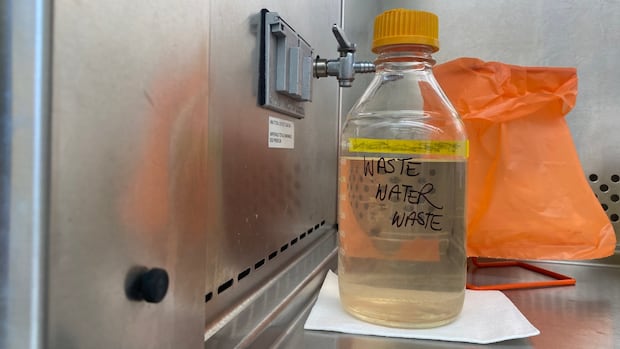Alberta’s decision to reduce access to publicly funded COVID-19 vaccines so far appears to set the province on a different course than many other Canadian jurisdictions.
Most Albertans will no longer be eligible for a free COVID-19 shot this fall.
The provincial government recently announced plans to limit coverage to specific high-risk groups, including Albertans living in care homes and group settings, those receiving home care, people on social programs such as AISH, and immunocompromised individuals.
All other seniors, pregnant Albertans and health care workers are not included, despite strong recommendations by the National Advisory Committee on Immunization (NACI) that they should be vaccinated. NACI also recommends that everyone else may receive an annual dose.
The Alberta government has cited vaccine waste as a key reason for its decision. It pegs the cost at roughly $110 per dose and estimates $135 million worth of vaccines have been discarded.
“I think over the last number of years we’ve seen Alberta become more of an outlier when it comes to vaccine policy and vaccine programming,” said Dr. Samir Sinha, a geriatrician and director of health policy research at the National Institute on Ageing.
“As far as I know right now Alberta is the only province in the country that has diverged from the NACI recommendations.”
The change has come about as responsibility for ordering and buying COVID-19 shots shifts from the federal government to the provinces and territories.
Other provinces
CBC News reached out to each province and territory to find out how they’re handling COVID-19 vaccine coverage moving forward. Most responded prior to publication time.
British Columbia said it will continue to provide universal coverage. That means all B.C. residents six months of age and older will be eligible for free COVID-19 vaccines this fall and winter. The province’s Ministry of Health said those who are at high risk will be strongly encouraged to get a dose.
Ontario pointed to its policy, which states that all residents six months of age and up are eligible for COVID-19 vaccination each fall. The website states annual shots are free of charge.
The Saskatchewan government is still developing its fall and winter immunization policy but told CBC News it is “committed to providing a COVID-19 immunization program based on scientific evidence and clinical expert recommendations made by the National Advisory Committee on Immunization (NACI).”
Manitoba has signalled it will ensure COVID-19 vaccines are available and free to the public.
When asked whether Manitoba would follow Alberta’s lead at a recent press conference, Manitoba Health Minister Uzoma Asagwara was unequivocal.
“Vaccines are important. We are a government that believes in science,” Asagwara said.
“COVID vaccines will be readily available for Manitobans at the right time. There will be no charge. There are lots of vaccines that we’re encouraging people to get. We listen to our public health experts.”
The government of Yukon plans to offer free COVID-19 shots to everyone, aged six months and older, alongside influenza vaccines this fall, an official confirmed.
Nunavut’s government said it intends to follow NACI guidance.
A spokesperson said the territory will continue offering COVID shots for free to all residents with priority given to high-risk groups including elders aged 65 and up, people with chronic medical conditions, those in long-term care, pregnant individuals and others.
A spokesperson for the government of Northwest Territories told CBC News it is working to align its policy with NACI guidance and that the vaccine remains free of charge to all individuals who believe they are high risk, including seniors and people who are moderately to severely immunocompromised.
Nova Scotia said it too will continue to provide free COVID-19 shots, based on the NACI guidance.
Prince Edward Island similarly said it plans to offer the vaccine for free to the groups recommended by NACI.
And Quebec and New Brunswick told CBC News they’re still finalizing their plans for this fall.
Barriers to access
Fiona Clement, a professor in the department of community health sciences at the University of Calgary’s Cumming School of Medicine, said Alberta is “really going in a different direction than the other provinces are moving in.”
She pointed out that Alberta continues to offer many other vaccines — ranging from childhood immunizations to annual flu shots — for free.
“I do think it underscores that COVID is politicized in a way that other diseases have not been. And it’s a bit disappointing to see when really COVID is a very serious infectious disease,” Clement said.
Provincial data shows 373 Albertans died due to COVID-19 from August 2024 to June 21, 2025. Influenza resulted in 235 deaths during the same time period.
In addition to reducing access, the Alberta government is no longer allowing pharmacies to offer COVID vaccines.
They will have to be booked through public health clinics. Albertans are expected to pre-order their doses starting on Aug. 11.
“There’s a wealth of evidence that demonstrates the more barriers you put up, the lower uptake is,” Clement said.
“I think we can expect lower vaccination rates, higher hospitalization rates and higher death rates. And that’s really disappointing.”

Government responds
The Alberta government, meanwhile, called the move a “responsible, targeted approach.”
“Following the federal government’s recent decision to no longer provide COVID-19 vaccines free of charge, Alberta is introducing a cost-recovery model to help offset procurement costs and ensure a sustainable solution for Albertans,” an emailed statement from the office of the minister of Primary and Preventative Health Services said, in part.
“Alberta’s decisions on coverage and access, while informed by NACI’s broad recommendations, are tailored to the province’s specific needs, taking into account factors … including expected uptake, previous wastage, and the number of individuals most vulnerable to severe outcomes.”
The provincial government also points to declining COVID-19 vaccination rates. Alberta’s respiratory virus dashboard shows 13.7 per cent of Albertans received a COVID-19 shot during the last respiratory virus season.
“And vaccine uptake among lower-risk groups has declined significantly in recent seasons,” the statement said.
“Reflecting these realities, Alberta’s COVID-19 vaccine program will focus on high-risk populations most vulnerable to severe outcomes, while ensuring the best use of taxpayer dollars.”
Meanwhile, Sinha, the director of health policy research at the National Institute on Ageing, questioned whether Alberta’s decision could spark other provinces to back off their coverage plans down the line.
“Now that Alberta is saying that we’re no longer going to cover it for everybody — that NACI would recommend otherwise to be covered — this might open the other door for other provinces that were hedging as well to say, ‘If Alberta’s not going to cover everyone, neither should we,'” he said.
While the provincial government said its policy followed national guidance, Sinha echoed concerns from other doctors who argue the province is deviating from NACI’s recommendations.
He’s worried all this will create confusion moving forward.
“My concern about what Alberta’s approach is right now is that it’s creating less confidence, less convenience and more cost and more barriers to getting vaccinated, which I think is ultimately going to worsen the public health of Albertans,” he said.






